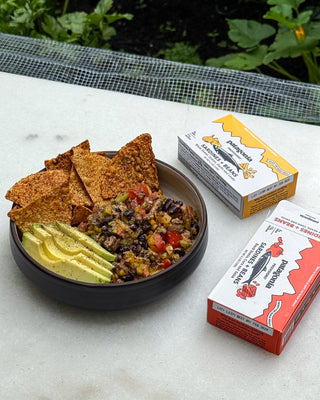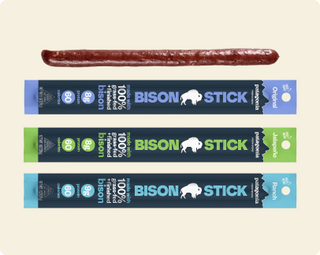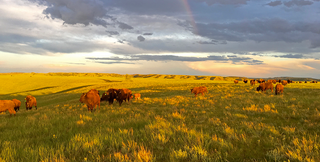Photo by Jill O'brien
The bison we source for our 100% grass-fed and grass-finished bison sticks are never fed grain. Instead, they are pasture-raised across 500,000 acres of their native prairie and humanely harvested. This is a drastic shift away from the harmful practices of most commercially raised meat.

Photo by Amy Kumler
Our work with Wild Idea Buffalo provides traceable, transparent sourcing and ensures that our bison exist in their native habitat. They freely graze on their intended diet of native grasses—unlike 90% of bison and 98.5% of beef raised for food, which are exposed to harmful and unethical methods of factory farming. Instead our bison play a vital role in sustaining the Great Plains ecosystem.
The majority of meat production, in confined animal feeding operations (CAFOs), receives a diet that is bad for both the animal and anyone who consumes the meat. A grain-fed or grain-finished diet often includes GMO corn, GMO soy, fast food waste, animal by-products such as chicken waste, as well as herbicides and pesticides from the grain crops. The inhumane conditions in CAFOs also raise the animals’ cortisol levels, bringing them measurably increased stress, which causes the meat to retain fewer vitamins and minerals while also becoming more susceptible to bacterial contamination.
The grain-fed diet from industrialized agriculture is also bad for the environment. Given cattle were not intended to consume grain, it ferments during digestion, in turn producing methane. This has become a significant contributor to climate change, with the methane produced by grain-fed cattle now accounting for 12-percent of greenhouse gas emissions globally.

Photo by Jill O'brien
The grass-fed, grass-finished bison from Wild Idea Buffalo offer an alternative red meat that combats climate change. As a keystone species of the Great Plains, the bison’s unique grazing patterns—across vast areas and in harmony with the native grasses—are essential to an ecosystem that is responsible for large-scale carbon storage in the thriving grasslands.
Wild Idea Buffalo became the first meat producer in the U.S. to have received the esteemed Regenerative Organic Certification® (ROC™) status for its products, maintaining the highest standards in organic agriculture, soil health, animal welfare, and social fairness. This builds on the USDA Certified Organic standards by focusing not only on the final product but also the environmental and human impact that went into its creation. Regenerative Organic Certified® products go one step further in supporting carbon storage and soil health.
As the Wild Idea team puts it, “Regenerative agriculture is more than a method of production. It is a movement. It respects the ancient wisdom of indigenous practices, focusing on the interconnectedness of all life. By rehabilitating soil, respecting animal welfare, and enhancing farmer livelihoods, regenerative organic agriculture is a beacon of hope in addressing our overall climate challenges.”





